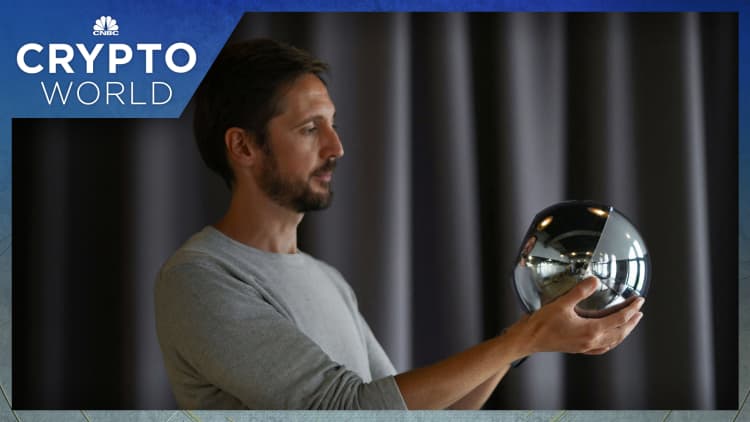Worldcoin rep in Uganda earns bonus for each person he signs up

For the past year, Keneth Byarugaba has been working as a runner for Worldcoin in Uganda. His job is to get as many people as possible to scan their eyeballs into a big metallic orb in exchange for about $60 worth of cryptocurrency.
Runners, who are paid a commission based upon how many Ugandans they recruit to sign up, station themselves in shopping malls, universities and on sidewalks to try to sell passersby on the idea of trading their biometric data for a new kind of digital identity known as a World ID.
“I knew I had what they needed because this was much more like a marketing job where you have to teach people about something and make them pique interest — something that I knew I could do so well,” said Byarugaba, who told CNBC that his knack for engaging strangers was perfected during his days as an Uber driver.
Getting on Worldcoin’s payroll involved jumping through a few hoops.
After passing the application and interview phase, Byarugaba was one of around 500 recruits. A battery of trainings and examinations on blockchain and marketing slimmed his class size down to about 200 employees. The organization’s goal is to make Worldcoin a household name in Uganda.
Byarugaba and his colleagues are selling the idea of being part of a novel world economy, where a scan of your iris unlocks access to universal basic income, online banking and a new form of virtual currency that streamlines the process of paying bills.
The narrative is sticky, and apparently, effective. Worldcoin says more than 2.2 million people have signed up since its soft launch in late 2021, though the organization’s ultimate ambition is to scale to 2 billion people.
But governments have expressed concerns over the biometric enrollment process and possible violations of national data protection laws. Some potential applicants are nervous about the aggressive evangelism associated with the product, as well.
“It just looked like a cool, fancy ball, which I discovered later took biometric IDs from people,” said Namureba Abel, who has worked in the crypto industry for the last decade.
“It looked like a scam mainly because of the focus on marketing and signing up new users,” continued Abel. “They were everywhere. They were in every mall here in Kampala.”
Abel works for Yellow Card, the largest centralized crypto exchange on the continent, and is typically a big advocate of emerging tech in the digital asset sector.
“The trigger for me was just their marketing style and how many users are signing up without any formal education,” he said. “They were actually paying people for data.”
‘A bit too dystopian’
When Muvya Muthama went to a mall in Nairobi, Kenya, to get his hair cut at the end of July, a long queue of people caught his eye. The line, he soon found out, was comprised of Kenyans keen on getting 25 Worldcoin “WLD” tokens — a free sign-up bonus given to all those who scanned their eyes into the orb.
Muthama, who also works for Yellow Card, was simultaneously intrigued and…
Read More: Worldcoin rep in Uganda earns bonus for each person he signs up
